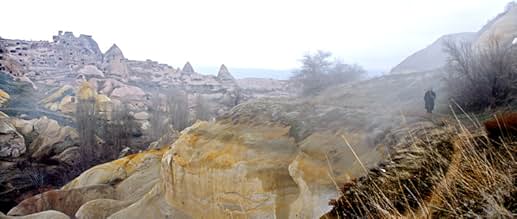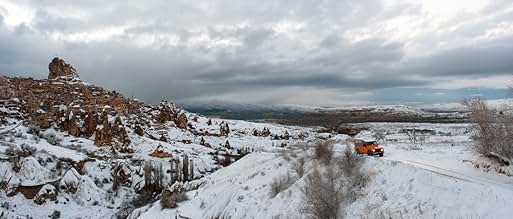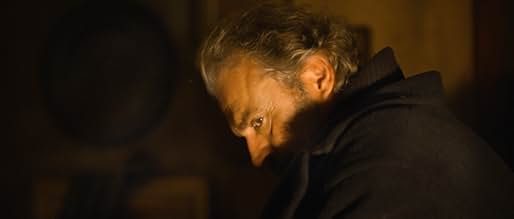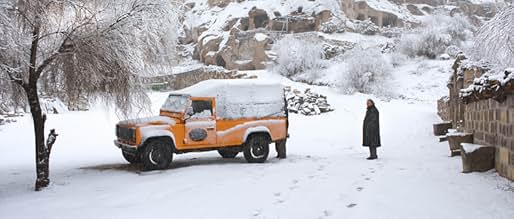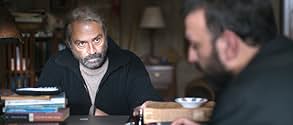A hotel owner and landlord in a remote Turkish village deals with conflicts within his family and a tenant behind on his rent.A hotel owner and landlord in a remote Turkish village deals with conflicts within his family and a tenant behind on his rent.A hotel owner and landlord in a remote Turkish village deals with conflicts within his family and a tenant behind on his rent.
- Director
- Writers
- Stars
- Awards
- 19 wins & 32 nominations total
Serhat Mustafa Kiliç
- Imam Hamdi
- (as Serhat Kiliç)
- Director
- Writers
- All cast & crew
- Production, box office & more at IMDbPro
Featured reviews
Winner of the prestigious Palme d'Or at 2014 Cannes Film Festival, Winter Sleep arrives with high expectations but succeeds amazingly well in living up to its new-found honour for this Turkish drama is simply one of the most engrossing, mesmerizing & satisfying narratives to surface on the silver screen in the past year, and is definitely one of the best films of 2014.
Set in Anatolia, the story of Winter Sleep concerns Aydın; the wealthy owner of a mountaintop hotel who was once an actor but has since fallen into the hibernation mode over the years. The plot covers the chaos his self-involved persona brings to his small kingdom as the animosity of his loved ones & the poor people under his reign begins surfacing once the winter approaches.
Directed by Nuri Bilge Ceylan, the film takes a very methodical, patient & firm approach with its narrative which does a stellar job in slowly unraveling the inner details of the various characters inhabiting this story. The entire story is an amalgamation of one conversation after another but it's how each discussion begins & ends plus seamlessly switches from one to another that makes it such an immersive experience.
The locations are wonderfully chosen, set pieces are finely detailed, the hotel itself creates a calm but secluded ambiance which becomes all the more suffocating on the advent of winter. Camera-work is mostly still yet effective plus the landscapes are beautifully photographed, its 196 minutes of runtime never really bothers for the most part, thanks to its breezy storytelling & the score makes its presence felt just when it's required.
Coming to the performances, every single actor here chips in strongly in their given roles & leave nothing to complain about. Haluk Bilginer delivers a magnificent performance as Aydın, and is brilliantly supported by Demet Akbağ & Melisa Sözen who play his sister & wife, respectively. The rest of the cast also shines since each character is deftly scripted & gradually developed which differentiates them from caricatures.
On an overall scale, Winter Sleep is an intensely gripping, masterfully told & exquisitely layered study of a self-righteous character that also takes an interesting look at failing relationships, old age regrets, class divides, and the morals of right & wrong. And despite its challenging runtime, dialogue-driven plot & slow-burn narration, it manages to be a truly immersive & absorbing cinema that's worthy of your time & money. Highly recommended.
Set in Anatolia, the story of Winter Sleep concerns Aydın; the wealthy owner of a mountaintop hotel who was once an actor but has since fallen into the hibernation mode over the years. The plot covers the chaos his self-involved persona brings to his small kingdom as the animosity of his loved ones & the poor people under his reign begins surfacing once the winter approaches.
Directed by Nuri Bilge Ceylan, the film takes a very methodical, patient & firm approach with its narrative which does a stellar job in slowly unraveling the inner details of the various characters inhabiting this story. The entire story is an amalgamation of one conversation after another but it's how each discussion begins & ends plus seamlessly switches from one to another that makes it such an immersive experience.
The locations are wonderfully chosen, set pieces are finely detailed, the hotel itself creates a calm but secluded ambiance which becomes all the more suffocating on the advent of winter. Camera-work is mostly still yet effective plus the landscapes are beautifully photographed, its 196 minutes of runtime never really bothers for the most part, thanks to its breezy storytelling & the score makes its presence felt just when it's required.
Coming to the performances, every single actor here chips in strongly in their given roles & leave nothing to complain about. Haluk Bilginer delivers a magnificent performance as Aydın, and is brilliantly supported by Demet Akbağ & Melisa Sözen who play his sister & wife, respectively. The rest of the cast also shines since each character is deftly scripted & gradually developed which differentiates them from caricatures.
On an overall scale, Winter Sleep is an intensely gripping, masterfully told & exquisitely layered study of a self-righteous character that also takes an interesting look at failing relationships, old age regrets, class divides, and the morals of right & wrong. And despite its challenging runtime, dialogue-driven plot & slow-burn narration, it manages to be a truly immersive & absorbing cinema that's worthy of your time & money. Highly recommended.
I didn't know what to expect from Nuri Bilge Ceylan's "Winter Sleep", but the title gave me the right hint. I could feel some introspective vibes from that title that sounded like Ingmar Bergman's "Winter Light". That the film ran over three hours did scare me a little, I dreaded the borefest but as soon as it started I knew the guide to my journey would be a competent filmmaker who wouldn't indulge into narrative tricks to entertain me. This is a serious and deep movie, that never feels too long or wordy and that can't be labeled as pretentious because it questions and even mocks that elitist pretension.
Aydin (Haluk Bilginer) could be the alter-ego of Ceylan, a former actor owning a mountaintop hotel in Anatolia, which is far from the tourism-friendly archetypes associated to Turkey. Don't expect a sunny sky and shades of blue from the Mediterranean sea, we are in a place that is dominated by the natural elements, where urban turmoils have no bearing whatsoever on the inhabitants. It's not exoticism but escapism as those who live here are either too poor to move out or voluntarily exiled themselves from the city, out of an urge to find some inner peace or to fulfill some projects, others are just letting their soul hibernating, hoping for sunnier tomorrows.
But isolation can either bring the best or the worst and where Aydin finds inspiration to the columns he writes and his procrastinated project of writing a memoir on Turkish theatre, his younger wife Nihar (Melissa Sozen) and his sister Necla (Demet Akbag) find boredom and desperately look for any possible loophole that can guide them into an oasis of meaning, even artificial. That's the paradox of people trapped together with each one going in one direction, at the end you're estranged to the closest ones. The general idea might sound too pompous but it is handled through powerful conversations where one snarky remark can snowball into more devastating and hurtful comments, revealing the characters' deepest secrets and insecurities.
Aydin is a man who never refuses dialogues, he cares about people and is generally ready to listen. But within his own intellectual certitudes, he passes as an arrogant man, incapable to understand the little people, whereas the tenants of the residences he owns, people who live in religion (while he's the educated and open-minded) and with time both his sister and wife also feel belittled. Though Aydin does nothing offensive and insulting, it's all in his attitude, something that is only partially betrayed through little patronizing thoughts he shares here and there or hides behind his eloquence.
But I make it sound as if the film doesn't deal with a story, there are events that break the relative monotony. A kid throws a rock on Aydin's jeep, he's the son of Ismail, a man who's been put in jail and whose belongings were confiscated by money collectors (umbeknownst to Aydin). Ismael (Nejat Isler with his piercing eyes) reminded me of the lower-class husband in the Iranian film "A Separation", a man incapable to feel empathy toward upper class people no matter how well-intentioned they are. He's a prisoner of his own prejudices and unlike his brother, the local imam, finds refuge in alcohol rather than religion. The brother (Serhat Mustafa Kiliç) constantly sugarcoats his words with syrupy politeness and an exaggerated smile that reinforces Aydin's perception of religious people as hypocrites and bigots.
But in one of the most powerful scenes of the film, the sister blames Aydin for being hypocritical too, and judgmental, he condemns people of religion while having never set a food in a mosque and dilutes his frustration in a vain desire to please some fans. It escalates to the point that Aydin as a defensive mechanism insults her, calling her an eternal malcontent venting her post-divorce anger. Later, a similar conversation occurs when he accuses his wife of being too naïve with her fundraising projects and criticizing her lack of bookkeeping skills. Aydin can't realize that this is less a project than an opportunity to give her life a meaning. But we know a bad guy he's not and "Winter Sleep" is only the chronicle of isolation and how it makes people drive people into spinning in their own private areas, so much privacy that even when people discuss, you never see them in the same frames, an interesting trick conveying a double isolation.
It's an existential condition that Aydin disregards as a luxury, real people have no time for such foolishness; during winter, they have to think of fire, school, food, even hunting. The film takes us to one scene to another where all is up to us is to listen to these people, to their ideas, their perceptions, an inebriated dinner leads a man to quote "Richard III" and rejects conscience as a trick used by cowards. In a parallel scene, when Nihar offers money to Ismail's brother out of guilt-stricken charity, Ismail acts as if her good conscience meant absolutely nothing to him. The film shows the eternal gaps between people who can afford thinking and some who can only resign themselves for better or worse, an imam, an alcoholic or a widower who tolerates adversity.
Another conversation has the women talk about how we can fight evil by letting him act and see if it can self-destruct, Aydin rejects the idea without realizing that it's the exact way people behave, by surrendering to their own demons while others just let the flow of life drown them and don't bother fighting it. It's easier to deal with the evil that governs us than whatever belongs to the other. And that the most meaningful and humbles words are spoken in voice-over makes the ending bittersweet and frustrating, but so relatable. For a film so rich in communication, it's rather infuriating that a few people really communicate.
Aydin (Haluk Bilginer) could be the alter-ego of Ceylan, a former actor owning a mountaintop hotel in Anatolia, which is far from the tourism-friendly archetypes associated to Turkey. Don't expect a sunny sky and shades of blue from the Mediterranean sea, we are in a place that is dominated by the natural elements, where urban turmoils have no bearing whatsoever on the inhabitants. It's not exoticism but escapism as those who live here are either too poor to move out or voluntarily exiled themselves from the city, out of an urge to find some inner peace or to fulfill some projects, others are just letting their soul hibernating, hoping for sunnier tomorrows.
But isolation can either bring the best or the worst and where Aydin finds inspiration to the columns he writes and his procrastinated project of writing a memoir on Turkish theatre, his younger wife Nihar (Melissa Sozen) and his sister Necla (Demet Akbag) find boredom and desperately look for any possible loophole that can guide them into an oasis of meaning, even artificial. That's the paradox of people trapped together with each one going in one direction, at the end you're estranged to the closest ones. The general idea might sound too pompous but it is handled through powerful conversations where one snarky remark can snowball into more devastating and hurtful comments, revealing the characters' deepest secrets and insecurities.
Aydin is a man who never refuses dialogues, he cares about people and is generally ready to listen. But within his own intellectual certitudes, he passes as an arrogant man, incapable to understand the little people, whereas the tenants of the residences he owns, people who live in religion (while he's the educated and open-minded) and with time both his sister and wife also feel belittled. Though Aydin does nothing offensive and insulting, it's all in his attitude, something that is only partially betrayed through little patronizing thoughts he shares here and there or hides behind his eloquence.
But I make it sound as if the film doesn't deal with a story, there are events that break the relative monotony. A kid throws a rock on Aydin's jeep, he's the son of Ismail, a man who's been put in jail and whose belongings were confiscated by money collectors (umbeknownst to Aydin). Ismael (Nejat Isler with his piercing eyes) reminded me of the lower-class husband in the Iranian film "A Separation", a man incapable to feel empathy toward upper class people no matter how well-intentioned they are. He's a prisoner of his own prejudices and unlike his brother, the local imam, finds refuge in alcohol rather than religion. The brother (Serhat Mustafa Kiliç) constantly sugarcoats his words with syrupy politeness and an exaggerated smile that reinforces Aydin's perception of religious people as hypocrites and bigots.
But in one of the most powerful scenes of the film, the sister blames Aydin for being hypocritical too, and judgmental, he condemns people of religion while having never set a food in a mosque and dilutes his frustration in a vain desire to please some fans. It escalates to the point that Aydin as a defensive mechanism insults her, calling her an eternal malcontent venting her post-divorce anger. Later, a similar conversation occurs when he accuses his wife of being too naïve with her fundraising projects and criticizing her lack of bookkeeping skills. Aydin can't realize that this is less a project than an opportunity to give her life a meaning. But we know a bad guy he's not and "Winter Sleep" is only the chronicle of isolation and how it makes people drive people into spinning in their own private areas, so much privacy that even when people discuss, you never see them in the same frames, an interesting trick conveying a double isolation.
It's an existential condition that Aydin disregards as a luxury, real people have no time for such foolishness; during winter, they have to think of fire, school, food, even hunting. The film takes us to one scene to another where all is up to us is to listen to these people, to their ideas, their perceptions, an inebriated dinner leads a man to quote "Richard III" and rejects conscience as a trick used by cowards. In a parallel scene, when Nihar offers money to Ismail's brother out of guilt-stricken charity, Ismail acts as if her good conscience meant absolutely nothing to him. The film shows the eternal gaps between people who can afford thinking and some who can only resign themselves for better or worse, an imam, an alcoholic or a widower who tolerates adversity.
Another conversation has the women talk about how we can fight evil by letting him act and see if it can self-destruct, Aydin rejects the idea without realizing that it's the exact way people behave, by surrendering to their own demons while others just let the flow of life drown them and don't bother fighting it. It's easier to deal with the evil that governs us than whatever belongs to the other. And that the most meaningful and humbles words are spoken in voice-over makes the ending bittersweet and frustrating, but so relatable. For a film so rich in communication, it's rather infuriating that a few people really communicate.
Have for a long time absolutely loved foreign language films, with 'Pan's Labyrinth' and 'A Very Long Engagement' making major impressions on me in school (and they are still favourites). Have actually seen very few Turkish films, but watched 'Winter Sleep' because of trusted friends raving over it and also the critical acclaim. With many recently seen highly regarded films being from my experience as great as said, expectations were high. The idea of the film also fascinated me.
'Winter Sleep' did not disappoint at all. Actually thought it one of the best films seen by me in a long time. The film is indeed long at nearly three and a half hours, but that didn't bother me. Having seen plenty of films with long lengths, some even longer, that still transfixed. It is indeed talk heavy, which is not always a good thing to me, depending on how good the talk is and how much is necessary. And it is indeed slow, or should we say deliberately, paced, but in my experience slow paced does not immediately equal bad (some of the best and most influential films ever made are slow).
Everything works. The scenery is absolutely breath taking, suitably bleak in parts but also hauntingly beautiful and atmosphere filled. The photography is quite stunning as well, really appreciated that there weren't any dizzying camera angles, fast cuts or slow motion, it is instead kept still and simple but is absolutely beautiful in that. It really makes the atmosphere speak for itself. The music is only used when necessary, but when it is used it is haunting and suitably melancholic.
The film is superbly scripted, as said it is heavy in talk. But it is truly thought provoking and powerful talk and all of it felt necessary and added a lot to the complexity of the characters. The story never felt dull and it didn't feel over-stretched either, it is not one of those films that tries to do too much narratively and takes its time to build but it really succeeds in making the tough, sensitive subject and themes bleakly uncompromising yet moving, making the intimacy of some of the storytelling really come to life emotionally and giving meat to the characters. The long length for me actually flew by.
Moreover, the lead character is not easy to get behind to begin with, but he does grow the more he understands what is going on around him, what his conflicts are doing to others and the more his motivations are understood. The film is sublimely acted, with Haluk Bilginer giving one of the best and most complex performances of the year that should have gotten more award recognition.
Summing up, absolutely wonderful. 10/10.
'Winter Sleep' did not disappoint at all. Actually thought it one of the best films seen by me in a long time. The film is indeed long at nearly three and a half hours, but that didn't bother me. Having seen plenty of films with long lengths, some even longer, that still transfixed. It is indeed talk heavy, which is not always a good thing to me, depending on how good the talk is and how much is necessary. And it is indeed slow, or should we say deliberately, paced, but in my experience slow paced does not immediately equal bad (some of the best and most influential films ever made are slow).
Everything works. The scenery is absolutely breath taking, suitably bleak in parts but also hauntingly beautiful and atmosphere filled. The photography is quite stunning as well, really appreciated that there weren't any dizzying camera angles, fast cuts or slow motion, it is instead kept still and simple but is absolutely beautiful in that. It really makes the atmosphere speak for itself. The music is only used when necessary, but when it is used it is haunting and suitably melancholic.
The film is superbly scripted, as said it is heavy in talk. But it is truly thought provoking and powerful talk and all of it felt necessary and added a lot to the complexity of the characters. The story never felt dull and it didn't feel over-stretched either, it is not one of those films that tries to do too much narratively and takes its time to build but it really succeeds in making the tough, sensitive subject and themes bleakly uncompromising yet moving, making the intimacy of some of the storytelling really come to life emotionally and giving meat to the characters. The long length for me actually flew by.
Moreover, the lead character is not easy to get behind to begin with, but he does grow the more he understands what is going on around him, what his conflicts are doing to others and the more his motivations are understood. The film is sublimely acted, with Haluk Bilginer giving one of the best and most complex performances of the year that should have gotten more award recognition.
Summing up, absolutely wonderful. 10/10.
A long theatrical play of dialogue and moods, thoughts and reflections, the absence of love or purpose, mixed with unchallenged and unsolved social inequalities, all placed into beautiful shots amid an astonishing natural environment. Very well played, with an almost unbearable iceberg of surpressed emotions and intellectually justified lack of action. Thought-provoking and emotionally touching, even if in a disturbing way.
Mr Nuri Bilge Ceylan had made adventurous efforts in his movie "Winter Sleep". Rewardingly, Palme d'Or Awards was passed onto his hands in 2014. A stunning feature of this movie was the eloquence of major characters. Because of this distinct feature, the audiences need feel comfortable to catch up with a large amount of intellectual debates and accusative questionings between the characters, in order to tap into the characters' inner worlds.
During three hours and sixteen minutes, a rich and deep portrait of various emotional sufferings are gradually unfolded. The audiences are exposed to intense conflicts between the rich and the poor, a complacent brother and his critical divorcée sister, an egoistic husband and an unhappy young wife and also a naive philanthropist and a resentful villager. Also, there are explosions and accumulations of negative emotional outbursts such as distrust, prejudice, loneliness, fear, suffocation, delusion, cynicism, hopelessness and hatred.
While viewing these interpersonal tensions and emotional despairs, it seems to me that our characters were all wearing shackles which had stopped them from finding their true inner strength. For Aydin, the shackle was his distrust and emotional rigidity. For Necla, it was her disapproving attitude and reluctance to change. For Nihal, it was her pessimistic view of her future. For Hamdi, it was his deeply-rooted shame and hatred towards the rich. For Hamid's little son Ilysa, it was his inability to fight against social unfairness. For Hamdi's bother Ismail, it was his involuntary submissiveness and unresisting. And perhaps due to these emotional scars, they all felt deprived of freedom and thus pushed each other into corners in order to feel justified.
Mr Nuri Bilge Ceylan opened an abundance of philosophical discussions in this movie. Seemingly he was unwilling to provide effective solution to ease any of these social and interpersonal tensions depicted in the movie. Nevertheless, Mr Ceylan did examine Aydin's self-revelation after he clashed with his sister Necla and his wife Nihal. When Aydin's false ego was badly stricken, the loneliness and pain in Aydin's heart must have been unbearably agonizing. From that moment, the movie started to openly unveil Aydin's vulnerabilities. He contemplated at his parents' graveyard. His messy hair was flying nowhere in the snow, looking terribly sad. When he showed genuine care to the young motorcyclist, that warmth didn't returned back to him. The releasing of a wild horse back to Anatolia steppe could indicate his longing to loosen his own rigidity and forceful mind. While waiting for his run-away train to Istanbul, he frankly demanded the company of his assistance Hidayet. He paid attention to a dead fox lying beside the rails in the snow and even checked birds of prey on the nearby tree. He watched the dying rabbit pitifully during hunting. At the end of the movie, Aydin admitted to himself that he was unable to live through life without Nihal. At this point, when Aydin acknowledged his emotional vulnerabilities, it appeared that he regained his peace and order, and even kicked off his long-term writing project on "the History of Turkish Theatre". Aydin perhaps realized that he no longer needed to be the superior one who was emotionally distant to people and himself, who felt like a king by being a columnist in his imaged kingdom, who loved his own civilized manner to contrast others'clumsiness, who was relying on rigidity to feel strong
Overall, this is a thought-provoking movie, managed by a master director and performed by impeccable cast. I would love to watch this movie again after a few years, as I wish to comprehend more of its richness and depth when life rewards me with more personal experiences.
During three hours and sixteen minutes, a rich and deep portrait of various emotional sufferings are gradually unfolded. The audiences are exposed to intense conflicts between the rich and the poor, a complacent brother and his critical divorcée sister, an egoistic husband and an unhappy young wife and also a naive philanthropist and a resentful villager. Also, there are explosions and accumulations of negative emotional outbursts such as distrust, prejudice, loneliness, fear, suffocation, delusion, cynicism, hopelessness and hatred.
While viewing these interpersonal tensions and emotional despairs, it seems to me that our characters were all wearing shackles which had stopped them from finding their true inner strength. For Aydin, the shackle was his distrust and emotional rigidity. For Necla, it was her disapproving attitude and reluctance to change. For Nihal, it was her pessimistic view of her future. For Hamdi, it was his deeply-rooted shame and hatred towards the rich. For Hamid's little son Ilysa, it was his inability to fight against social unfairness. For Hamdi's bother Ismail, it was his involuntary submissiveness and unresisting. And perhaps due to these emotional scars, they all felt deprived of freedom and thus pushed each other into corners in order to feel justified.
Mr Nuri Bilge Ceylan opened an abundance of philosophical discussions in this movie. Seemingly he was unwilling to provide effective solution to ease any of these social and interpersonal tensions depicted in the movie. Nevertheless, Mr Ceylan did examine Aydin's self-revelation after he clashed with his sister Necla and his wife Nihal. When Aydin's false ego was badly stricken, the loneliness and pain in Aydin's heart must have been unbearably agonizing. From that moment, the movie started to openly unveil Aydin's vulnerabilities. He contemplated at his parents' graveyard. His messy hair was flying nowhere in the snow, looking terribly sad. When he showed genuine care to the young motorcyclist, that warmth didn't returned back to him. The releasing of a wild horse back to Anatolia steppe could indicate his longing to loosen his own rigidity and forceful mind. While waiting for his run-away train to Istanbul, he frankly demanded the company of his assistance Hidayet. He paid attention to a dead fox lying beside the rails in the snow and even checked birds of prey on the nearby tree. He watched the dying rabbit pitifully during hunting. At the end of the movie, Aydin admitted to himself that he was unable to live through life without Nihal. At this point, when Aydin acknowledged his emotional vulnerabilities, it appeared that he regained his peace and order, and even kicked off his long-term writing project on "the History of Turkish Theatre". Aydin perhaps realized that he no longer needed to be the superior one who was emotionally distant to people and himself, who felt like a king by being a columnist in his imaged kingdom, who loved his own civilized manner to contrast others'clumsiness, who was relying on rigidity to feel strong
Overall, this is a thought-provoking movie, managed by a master director and performed by impeccable cast. I would love to watch this movie again after a few years, as I wish to comprehend more of its richness and depth when life rewards me with more personal experiences.
Did you know
- TriviaDirector Nuri Bilge Ceylan revealed that he had more than 200 hours of material and his original cut was 4 hours 30 minutes. He then "worked hard" to make it down to 3 hours 15 minutes.
- GoofsThe books in Aydin's hands change during the argument with his wife.
- ConnectionsReferenced in Estrenos Críticos: Perdida, Sueño de Invierno y One Direction (2014)
- SoundtracksSonata in A major D959 - Andantino
Composed by Franz Schubert
- How long is Winter Sleep?Powered by Alexa
Details
- Release date
- Countries of origin
- Official site
- Languages
- Also known as
- Sommeil d'hiver
- Filming locations
- Production companies
- See more company credits at IMDbPro
Box office
- Gross worldwide
- $4,018,705
- Runtime
- 3h 16m(196 min)
- Color
- Sound mix
- Aspect ratio
- 2.35 : 1
Contribute to this page
Suggest an edit or add missing content


